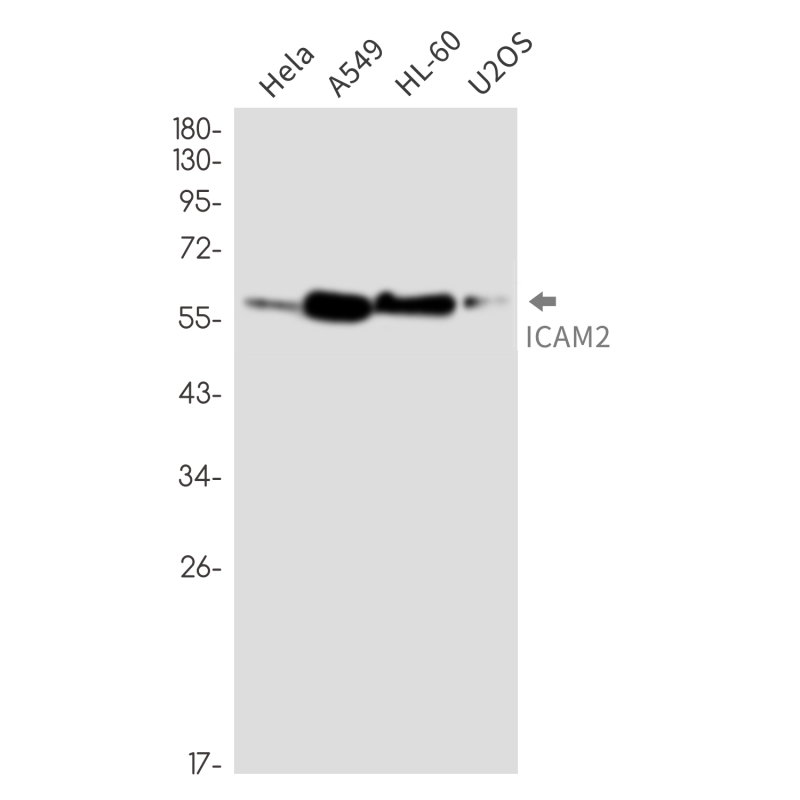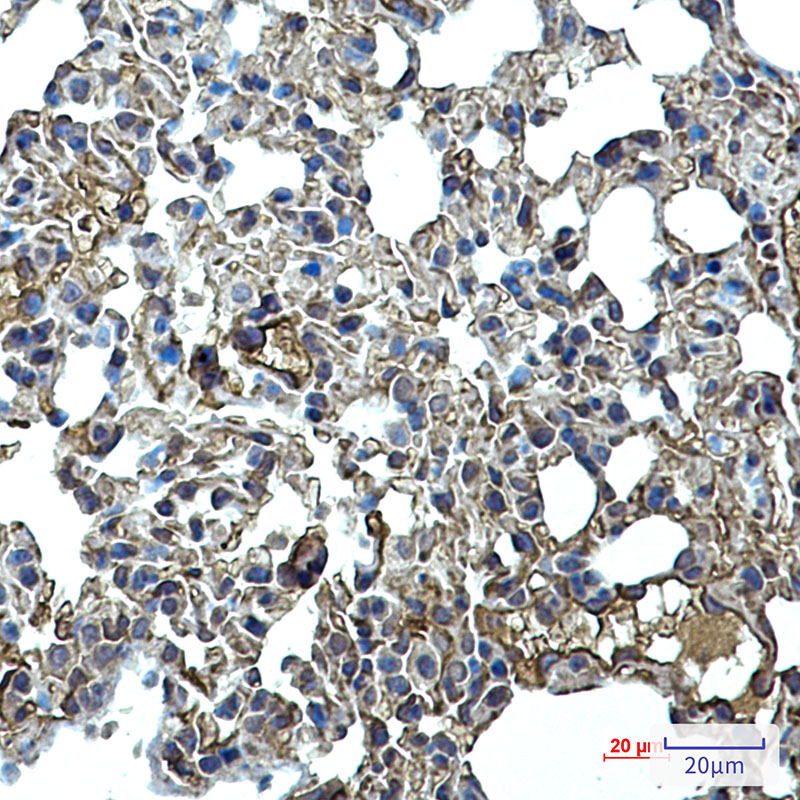

| WB | 1/500-1/1000 | Human,Mouse,Rat |
| IF | 1/20 | Human,Mouse,Rat |
| IHC | 1/50-1/100 | Human,Mouse,Rat |
| ICC | 技术咨询 | Human,Mouse,Rat |
| FCM | 咨询技术 | Human,Mouse,Rat |
| Elisa | 咨询技术 | Human,Mouse,Rat |
| Aliases | CD102; Ly-60; Icam-2 |
| Entrez GeneID | 15896 |
| WB Predicted band size | Calculated MW: 31 kDa; Observed MW: 50-60 kDa |
| Host/Isotype | Rabbit IgG |
| Antibody Type | Primary antibody |
| Storage | Store at 4°C short term. Aliquot and store at -20°C long term. Avoid freeze/thaw cycles. |
| Species Reactivity | Human,Mouse |
| Immunogen | Recombinant protein of mouse ICAM2 |
| Formulation | Purified antibody in TBS with 0.05% sodium azide,0.05%BSA and 50% glycerol. |
+ +
以下是关于ICAM2抗体的3篇参考文献示例(注:内容为模拟概括,建议通过学术数据库核实准确性):
---
1. **文献名称**:*ICAM-2 regulates vascular permeability and angiogenesis through Src-mediated endothelial cell-cell adhesion*
**作者**:Cheuk et al.
**摘要**:该研究利用抗ICAM2抗体阻断其功能,发现ICAM2通过调控内皮细胞间的黏附连接影响血管通透性和血管生成,揭示了其在肿瘤微环境中的潜在作用。
2. **文献名称**:*Targeting ICAM-2 in acute myeloid leukemia: A novel therapeutic strategy*
**作者**:Smith et al.
**摘要**:研究通过流式细胞术和免疫组化分析ICAM2在白血病细胞中的高表达,并证明使用ICAM2抗体可抑制癌细胞与骨髓基质的黏附,提示其治疗潜力。
3. **文献名称**:*Role of ICAM-2 in leukocyte trafficking during acute inflammation*
**作者**:Tanaka et al.
**摘要**:在小鼠炎症模型中,抗ICAM2抗体显著减少中性粒细胞向炎症部位的迁移,表明ICAM2是调控白细胞跨内皮迁移的关键分子。
---
**注意**:以上文献信息为示例,实际引用需通过PubMed、Google Scholar等平台核实具体作者、标题及摘要内容。
ICAM-2 (Intercellular Adhesion Molecule 2), a member of the immunoglobulin superfamily, is a transmembrane glycoprotein expressed primarily on endothelial cells, platelets, and certain immune cells. It plays a critical role in mediating leukocyte adhesion and trafficking by interacting with leukocyte integrins like LFA-1 (lymphocyte function-associated antigen-1). Unlike ICAM-1. ICAM-2 exhibits constitutive expression and is less responsive to inflammatory stimuli, suggesting its involvement in baseline immune surveillance and vascular homeostasis.
Antibodies targeting ICAM-2 are essential tools for studying its function in physiological and pathological contexts. They are used in applications such as flow cytometry, immunohistochemistry, and functional blocking assays to explore ICAM-2's role in angiogenesis, leukocyte-endothelial interactions, and inflammatory diseases. Research has also linked ICAM-2 dysregulation to cancer progression, atherosclerosis, and autoimmune disorders, highlighting its therapeutic or diagnostic potential.
ICAM-2 antibodies vary in specificity (e.g., recognizing human, mouse, or rat isoforms) and form (monoclonal/polyclonal), enabling diverse experimental designs. Recent studies focus on modulating ICAM-2-mediated signaling to regulate immune responses or inhibit pathological angiogenesis, underscoring its relevance in biomedical research.
×